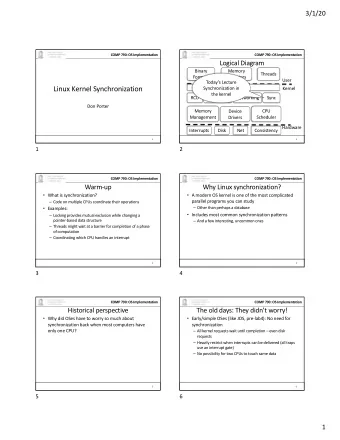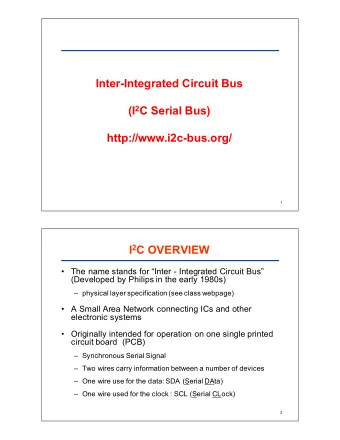
Exploiting COF Vulnerabilities in the Linux kernel Vitaly Nikolenko - PowerPoint PPT Presentation
Exploiting COF Vulnerabilities in the Linux kernel Vitaly Nikolenko @vnik5287 Ruxcon - 2016 Who am I? Security researcher @ SpiderLabs Exploit dev / bug hunting / reverse engineering Agenda 1. Counter overflows in the kernel
Exploiting COF Vulnerabilities in the Linux kernel Vitaly Nikolenko @vnik5287 Ruxcon - 2016
Who am I? • Security researcher @ SpiderLabs • Exploit dev / bug hunting / reverse engineering
Agenda 1. Counter overflows in the kernel • Exploitation techniques • Real case studies • Corner cases and challenges 2. COF static code analyser
Introduction • All trivial bugs are fixed (mostly) • Fuzzing (dumb, smart, guided by code coverage) • kmemcheck • Detects use-after-free accesses and uninitialised-memory-reads • SLUB_DEBUG / DEBUG_SLAB • Enables redzones and poisoning (writing magic values to check later) • Can detect some out-of-bounds and use-after-free accesses
Introduction • DEBUG_PAGEALLOC • Unmaps freed pages from address space • Can detect some use-after-free accesses • KASan • Fast and comprehensive solution for both UAF and OOB • Detects out-of-bounds for both writes and reads • KTSan • Fast data-race and deadlock detector
Introduction • Counter overflows are not easily detectable • Would require triggering the vulnerable path 2^32 times before UAF • Existing bug detection techniques are not very useful
Counter overflows • The purpose of the OS is to allow (concurrent) consumers • These consumers have a demand for (shared) resources that the OS needs to manage • The kernel needs to keep reference counters for shared resources, e.g., file descriptors, sockets, process specific structs, etc.
Counter overflows • Counter overflows - special case of integer overflows and UAF • There’s a vulnerable kernel path (reachable from user space) where • counter increments > counter decrements (counter overflow) • counter increments < counter decrements (counter underflow)
File refcounting struct file type = struct file { union { struct llist_node fu_llist; struct callback_head fu_rcuhead; } f_u; struct path f_path; struct inode *f_inode; const struct file_operations *f_op; spinlock_t f_lock; atomic_t f_count; unsigned int f_flags; fmode_t f_mode; struct mutex f_pos_lock; loff_t f_pos; struct fown_struct f_owner; const struct cred *f_cred; struct file_ra_state f_ra; ... }
File refcounting syscall(open, …) struct file *get_empty_filp(void) { const struct cred *cred = current_cred(); static long old_max; struct file *f; int error; f = kmem_cache_zalloc(filp_cachep, GFP_KERNEL); if (unlikely(!f)) return ERR_PTR(-ENOMEM); percpu_counter_inc(&nr_files); f->f_cred = get_cred(cred); error = security_file_alloc(f); if (unlikely(error)) { file_free(f); return ERR_PTR(error); } INIT_LIST_HEAD(&f->f_u.fu_list); atomic_set(&f->f_count, 1); ...
File refcounting Sharing the fd static inline struct file * get_file(struct file *f) { atomic_inc(&f->f_count); return f; }
File refcounting Closing fd/exiting the process void fput(struct file *file) { if (atomic_dec_and_test(&file->f_count)) { struct task_struct *task = current; file_sb_list_del(file); ... if (llist_add(&file->f_u.fu_llist, &delayed_fput_list)) schedule_delayed_work(&delayed_fput_work, 1); } }
File refcounting Atomic integers • Atomic API implemented by the kernel: • atomic_set - set atomic variable • atomic_inc - increment atomic variable • atomic_dec - decrement atomic variable • atomic_dec_and_test — decrement and test • atomic_inc_and_test — increment and test • etc
File refcounting Atomic integers (gdb) ptype atomic_t type = struct { int counter; }
Counter overflows • Data models: • x86 - ILP32 • x86_64 - LP64 • Signed integer 0 to 0xffffffff • Overflowing 4 bytes is quick right?
Counter overflows i7-4870HQ CPU @ 2.50GHz - user space #include <stdio.h> int main() { unsigned int count; for (count = 0; count < 0xffffffff; count++) ; return 0; } test:~ vnik$ time ./t real 0m8.293s user 0m8.267s sys 0m0.015s
Counter overflows i7-4870HQ CPU @ 2.50GHz - kernel space struct test { atomic_t count; struct rcu_head rcu; }; static void increment() { atomic_inc(&testp->count); } static long device_ioctl(struct file *file, unsigned int cmd, unsigned long args) { switch(cmd) { case IOCTL_SET: /* set counter value */ atomic_set(&testp->count, args); break; case IOCTL_INCREMENT: increment(); break; ... }
Counter overflows i7-4870HQ CPU @ 2.50GHz - kernel space int main() { int fd; fd = open(DEVICE_PATH, O_RDONLY); if (fd == -1) return -1; ioctl(fd, IOCTL_SET, 0); unsigned count; for (count = 0; count < 0xffffffff; count++) ioctl(fd, IOCTL_INCREMENT, 0); } vnik@ubuntu:~/$ time ./trigger1 real 58m48.772s user 1m17.369s sys 32m49.483s
Counter overflows Overflowing kernel integers • At least 30-60 min to overflow (approximately) • Not very practical in certain exploitation scenarios (mobile root?)
Counter overflows void * some_kernel_function() { ... struct file *f = fget(fd); ... if (some_error_condition) goto out; ... if (atomic_dec_and_test(&f—>f_count)) { call_rcu(...); // fput(f) out: return -EINVAL; }
VMM • Kernel implements a virtual memory abstraction layer • Using physical memory allocations is inefficient (fragmentation, increased swapping) • Basic unit of memory is a page (>= 4KB) • Kernel allocates memory internally for a large variety of objects
VMM Terminology • Pages are divided into smaller fixed chunks (power of 2) aka slabs • Pages containing objects of the same size are grouped into caches • SLAB allocator is the original slab allocator on implementation in OpenSolaris • SLAB (in caps) - specific slab allocator implementation • slab - generic term
VMM Linux SLUB allocator • Starting from 2.6 branch, the slab allocator can be selected at compile time (SLAB, SLUB, SLOB, SLQB) • SLUB is the default slab allocator on Linux • All allocators perform the same function (and are mutually exclusive) but there’re significant differences in exploitation
VMM Linux SLUB allocator • General-purpose allocations ( kmalloc/kzalloc ) are for objects of size 8, 16, 32, 64, 128, …, 8192 bytes • Objects that are not power of 2 are rounded up to the next closest slab size • Special-purpose allocations ( kmem_cache_alloc ) are for frequently-used objects • Objects of the ~same size are grouped into the same cache
VMM Linux SLUB allocator • No metadata in slabs • Instead, each slab page ( struct page ) has SLUB metadata ( freelist ptr, etc) • Free objects have a pointer (at offset=0 ) to the next free object in the slab (i.e., linked list) • The last free object in the slab has its next pointer set to NUL
VMM Linux SLUB allocator SLUB page { freelist* index=0; inuse=2; objects=5; … Free Free Free Allocated Allocated object object object object object NULL
Counter overflows Exploitation procedure 1. Overflow the counter by calling the vulnerable path A() until the counter —> 0 2. Find path B() that triggers kfree() if counter == 0 3. Start allocating target objects to fill partial slabs of the same size C() 4. Use the old object reference to 1. Modify the target object, or 2. Execute the ( overwritten ) function ptr in the vulnerable object 5. Trigger the overwritten function ptr in the target object
Counter overflows Step 4 - option #1 // assume sizeof(struct A) // Old kernel path == sizeof(struct B) ... a->some_var = 0; struct A { ... atomic_t counter; int some_var; ... }; struct B { void ( ∗ func)(); ... };
Counter overflows Step 4 - option #2 // assume sizeof(struct A) == // Old kernel path sizeof(struct B) ... a->func(...); struct A { ... atomic_t counter; void (*func)(); ... }; struct B { int dummy; long user_controlled_var; ... };
Counter overflows Step 4 - option #2 • Find the target object B , s.t., 1. B has user-controlled variables 2. The user-controlled variable is aligned with the function pointer in the vulnerable object A Vulnerable object A Target object B . . . . void (*func)(); user-controlled data . . . . . . . .
Counter overflows msgsnd() syscall struct { long mtype; char mtext[ARBITRARY_LEN]; } msg; memset(msg.mtext, 'A', sizeof(msg.mtext)); msqid = msgget(IPC_PRIVATE, 0644 | IPC_CREAT); if (msgsnd(msqid, &msg, sizeof(msg.mtext), 0) == -1) { ...
Counter overflows msgsnd() syscall long do_msgsnd(int msqid, long mtype, void __user *mtext, size_t msgsz, int msgflg) { struct msg_queue *msq; struct msg_msg *msg; int err; struct ipc_namespace *ns; ns = current->nsproxy->ipc_ns; if (msgsz > ns->msg_ctlmax || (long) msgsz < 0 || msqid < 0) return -EINVAL; if (mtype < 1) return -EINVAL; msg = load_msg(mtext, msgsz); ...
Counter overflows msgsnd() syscall struct msg_msg *load_msg(const void __user *src, size_t len) { struct msg_msg *msg; struct msg_msgseg *seg; int err = -EFAULT; size_t alen; msg = alloc_msg(len); if (msg == NULL) return ERR_PTR(-ENOMEM); alen = min(len, DATALEN_MSG); if (copy_from_user(msg + 1, src, alen)) goto out_err; ...
RCU • Kernel counter decrements and object freeing are often implemented via RCU calls • This introduces indeterminism in counter values • If 0-check is done using an RCU callback, can skip the check and overflow past 0
Recommend
More recommend
Explore More Topics
Stay informed with curated content and fresh updates.























